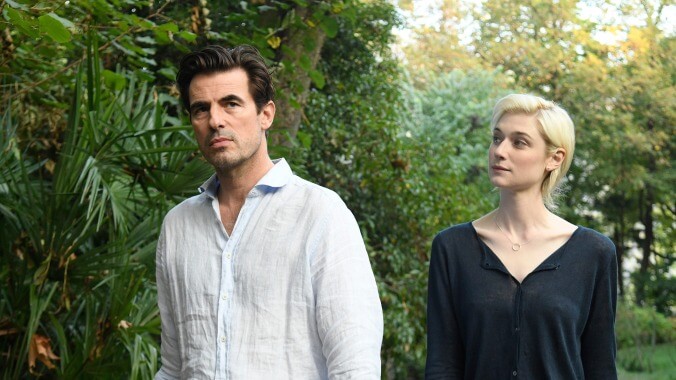Highbrow title aside, The Burnt Orange Heresy is a thriller of delectable surface pleasures

A movie boasting a title like The Burnt Orange Heresy seems to be begging for viewer sophistication, but this lightly engaging, low-key thriller practically dares you to treat it as serious art, in a couple of different ways. For one thing, its protagonist, James Figueras (Claes Bang, a Danish actor best known from The Square), is himself an art critic, and the movie opens with a lengthy lecture during which he shows his audience an apparently unremarkable abstract painting and then proceeds to wow them with the numerous symbolic and heavily autobiographical details buried within, before finally revealing that he made all of them up. The very notion of art’s abiding mysteries gets dismissed as rank pretension—not just overtly, in dialogue, but by a subsequent shift in focus to the absurdly tall and good-looking Figueras’ first encounter with absurdly tall and good-looking tourist Berenice Hollis (Elizabeth Debicki), who accurately accuses him of having piled bullshit on top of bullshit. It’s the sort of barbed flirtation of which magnificently superficial entertainment is made, and the two immediately wind up naked and horizontal.
So much for interpretation! As carnally fixated as James may currently be, however, he has to head out for an unusual assignment, and persuades Berenice to accompany him. The film’s narrative engine concerns the desire of an obscenely wealthy collector, Joseph Cassidy (Mick Jagger), to secure a painting from notoriously reclusive artist Jerome Debney (Donald Sutherland), who’s staying in a guest house on Cassidy’s enormous Lake Como estate. Like another famous Jerome—David Salinger—Debney has reportedly been at work for decades without allowing anyone else to see the results; all of his known paintings were lost in a fire long ago, and Cassidy desperately wants a new one—so much so, in fact, that he’s provided the man with a studio on his own property and now offers James the opportunity for a potential career-boosting exclusive interview with Debney… in exchange for just a wee bit of larceny. Fortunately, Berenice is on hand to serve as a distraction, though she, too, may be keeping some secrets.
Adapted from a 1971 novel by Charles Willeford (whose books previously inspired Miami Blues and The Woman Chaser), The Burnt Orange Heresy—titled after one of Debney’s mysterious paintings—doesn’t always make a whole lot of sense, at least on screen. Debney’s acclaimed work from his youth was entirely conceptual in nature, the most famous example consisting literally of an empty frame; we’re given no reason to believe that he even knows how to use a paintbrush, yet he’s treated throughout as if he’s his generation’s Monet, rather than its Banksy. Sutherland makes the artist so genially magnetic, though, that such logical objections seem beside the point. It’s easy to believe that the world at large eagerly awaits more information about the man himself, even as it’s impossible to believe that the art world would remember him as anything more than a passing fad. That’s the power of a star turn, and here we have three superlative ones. (Jagger doesn’t embarrass himself, which is all one can ever ask.) Debicki, in particular, cements her status as one of cinema’s most charismatic newcomers, deploying casual insouciance to generate effortless intrigue for a character who might be either more or less than she seems.
In short, this is fundamentally a movie of surface pleasures, placing gorgeous actors in an equally stunning location and letting them parry with sharp words and lithe, angular bodies. Italian director Giuseppe Capotondi previously made the little-seen, underrated mindbender The Double Hour (which should have made an international star of Kseniya Rappoport), and he once again demonstrates a facility for keeping the viewer slightly off balance, uncertain of anyone’s true motives but too engrossed to play guessing games. Debicki and Bang share beaker-burbling chemistry, and their easy badinage gives every scene an old-Hollywood crackle that’s pleasurable for its own sake. If the film as a whole ultimately feels a little shallow and flimsy, well, hey, it’s not as if we weren’t warned right up front.